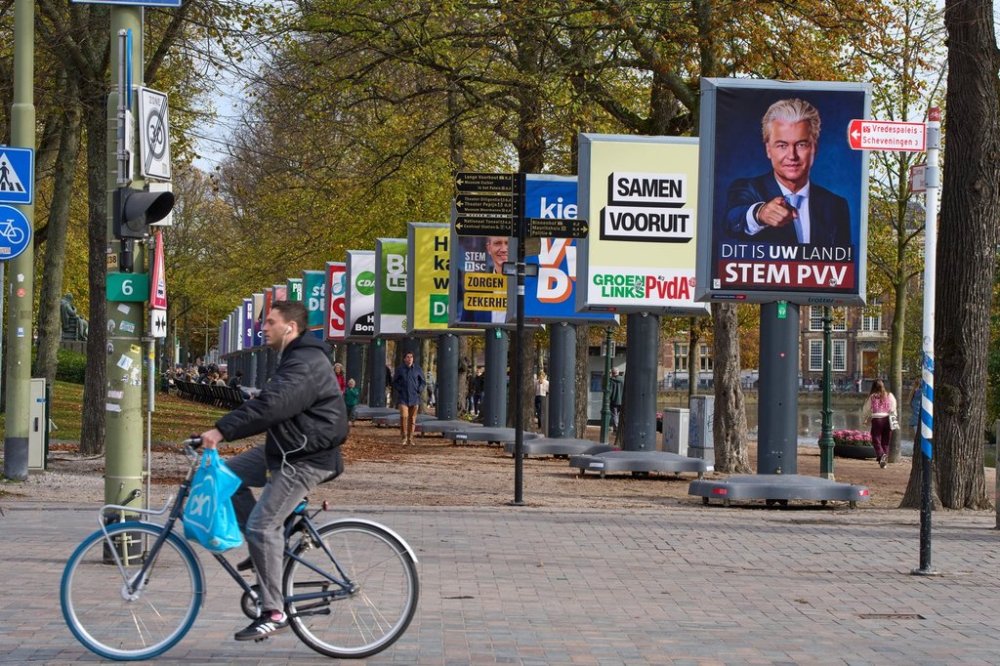Dutch election campaign in final stretch as Geert Wilders seeks second victory
Advertisement
Read this article for free:
or
Already have an account? Log in here »
To continue reading, please subscribe:
Monthly Digital Subscription
$1 per week for 24 weeks*
- Enjoy unlimited reading on winnipegfreepress.com
- Read the E-Edition, our digital replica newspaper
- Access News Break, our award-winning app
- Play interactive puzzles
*Billed as $4.00 plus GST every four weeks. After 24 weeks, price increases to the regular rate of $19.00 plus GST every four weeks. Offer available to new and qualified returning subscribers only. Cancel any time.
Monthly Digital Subscription
$4.75/week*
- Enjoy unlimited reading on winnipegfreepress.com
- Read the E-Edition, our digital replica newspaper
- Access News Break, our award-winning app
- Play interactive puzzles
*Billed as $19 plus GST every four weeks. Cancel any time.
To continue reading, please subscribe:
Add Free Press access to your Brandon Sun subscription for only an additional
$1 for the first 4 weeks*
*Your next subscription payment will increase by $1.00 and you will be charged $16.99 plus GST for four weeks. After four weeks, your payment will increase to $23.99 plus GST every four weeks.
Read unlimited articles for free today:
or
Already have an account? Log in here »
THE HAGUE, Netherlands (AP) — The Dutch election campaign was on the home stretch Tuesday, a day before the country goes to the polls in a knife-edge vote with anti-Islam lawmaker Geert Wilders seeking a second straight victory for his far-right Party for Freedom.
The campaign has largely focused on two main issues that also resonate throughout Europe — how to rein in the number of migrants and tackling a crisis of housing affordability and availability. Issues such as the climate and defense spending have taken a back seat.
Polls suggest that Wilders’ party, which is calling for a total halt to asylum-seekers entering the Netherlands, remains on track to be the largest bloc in the 150-seat House of Representatives, but other more moderate parties are closing the gap.

Christian Democrat leader Henri Bontenbal, who is tipped as a possible prime minister, said that the vote also is about who will be prime minister for the next four-year term.
“In the end, it is about the question of who is going to lead the next coalition, what kind of politics are we going to see in the coming years,” he said on national broadcaster NOS. “We have seen a lot of chaos and I think the Netherlands now hankers for something different.”
Polls open across the country at 7:30 a.m. (0630 GMT) on Wednesday and close at 9 p.m. (2000 GMT). Broadcasters publish an exit poll as soon as voting ends and update it a half-hour later.
After years in opposition, Wilders’ victory in the last election meant his party was the largest in the outgoing four-party coalition, but he torpedoed the administration after failing to push through all of what he called Europe’s toughest asylum and immigration policies.
He withdrew his party’s ministers in June, triggering the fourth general election in a decade and ensuring that the administration led by Prime Minister Dick Schoof will go down in history as one of the shortest-lived Dutch governments at just 11 months.
It could take months to form the next coalition after Wednesday’s vote. The Dutch system of proportional representation ensures coalitions, and with divisions deep across the political spectrum, tough negotiations lie ahead.
Mainstream parties argue that Wilders’ decision to bring down the government show that he can’t be trusted as a coalition partner and have ruled out working with Wilders in a new government.
Wilders urged his supporters to give him enough votes so that other parties will have to sit down with him for coalition negotiations.
“I hope people will vote with their hearts and with their minds so that at the end of the day my party will become the biggest and then we will deal with all the other parties,” he said at a weekend campaign event.
King Willem-Alexander called last month for a return to the Dutch culture of compromise amid polarization that has brought about the fourth general election in less than a decade. His appeal came in a speech written by the government.

